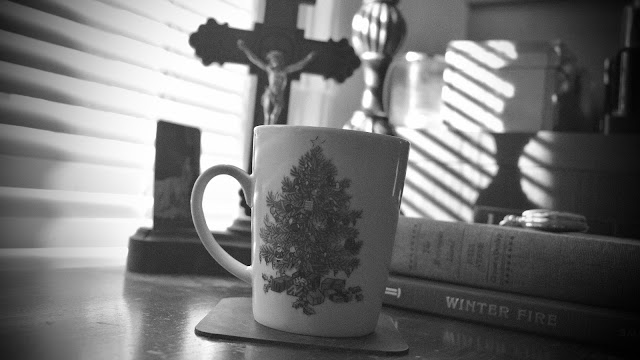Christmas as a Warm Cup of Coffee
It is an ancient paradox, as quiet and soft as snow itself: we do not love winter for its bitter winds or frostbitten days. Rather, we treasure it for the way it teaches us to cherish warmth. Like a traveler who has braved icy roads and numbing gusts of air, we come to adore winter not for its chill, but for the embrace of hearth and home that follows. It is not the cold itself, but the contrast, the firelight against the darkness, the warmth within set against the frozen without, that awakens our spirits and softens our hearts.
Christmas, then, is like a warm cup of coffee, held tenderly between our hands as we sit beside a frosted windowpane. The chill outside presses against the glass, but within, there is a kind of sanctuary, a refuge born of light and love. The steam rises softly from the rim of the cup, carrying with it the rich, earthy aroma of comfort. This simple cup, much like the Christmas season itself, reminds us that joy is often found in the simplest, most-regular pleasures.
Indeed, what would the glow of Christmas lights be without the dark December night to set them shining? Would the hum of a carol move us as deeply if not for the muffled stillness of snowfall blanketing the earth? The magic of this season resides in these juxtapositions, in roaring fireplaces against silent storms, in the shiver of breathless laughter as we make our way back indoors, cheeks rosy and hands numb, only to find ourselves bathed in the gentle warmth of welcome. The cold invites the warmth to be noticed, to be savored, to be understood as precious.
Snow, too, becomes part of this charm. Its beauty lies not only in its pristine purity but in its fleeting nature, a delicate reminder that comfort is often most cherished when set against discomfort. We gaze out upon a landscape blanketed in white, marveling at the silence it brings, its sparkle beneath moonlight like diamonds scattered across the earth. But we do so from the refuge of our homes, where curtains are drawn against the evening wind and candles flicker softly on the sill.
There is something innately human about this interplay between cold and warmth, a reflection of life itself. We do not appreciate peace unless we have known struggle. We cannot fully embrace love until we have felt its absence. Christmas, wrapped as it is in the trappings of joy and abundance, is meaningful precisely because it follows the long, dark stretch of autumn’s end. It is the celebration of light in a season of shadows, the promise of something beautiful in the midst of barrenness. Like a warm cup of coffee, it comforts, revives, and reminds us of what we hold most dear.
Yet Christmas is more than just warmth against winter. At its heart is the miracle of Christ’s birth, the true light breaking into the coldest darkness of humanity. In the humblest of places, where there was no room for Him save in a lowly stable, the Savior entered the world, bringing with Him a love so great it could banish every shadow. The contrast of His arrival is profound. He, the King of Kings, came not in grandeur, but in poverty. He, the infinite, became finite. The one who created the stars was laid beneath their quiet glow, wrapped in swaddling clothes and cradled in His mother’s arms. In this sacred contrast, we find the essence of Christmas: heaven touching earth, divinity clothed in flesh, warmth kindling against the chill of a broken world.
So it is with winter. We do not truly love the sharp sting of frost, the brittle air that bites through our coats, or the breath that hangs suspended in the icy morning. What we love is the way those very things teach us to recognize warmth, in the rich glow of a kitchen alive with laughter, in a thick knit blanket pulled close, in the first sip of something hot cradled against our chest. Winter reveals to us what summer often obscures: that warmth is a gift, and to have it is to know a kind of grace.
And thus, we find Christmas waiting for us just as that steaming cup of coffee, familiar, humble, and profound. It asks us to pause, to hold it carefully, to savor what it offers before it grows cold. For the truth is, warmth can be fleeting. A cup of coffee only stays warm for so long. Yet in this impermanence, we find its beauty, its invitation to return again and again, from the cold of the world back to the warmth of the heart. And there, in the tender contrast, we taste the very essence of Christmas: love held against pain, light against darkness, warmth against winter’s chill. We taste the miracle of Christ, born to be our warmth and our light forever.




